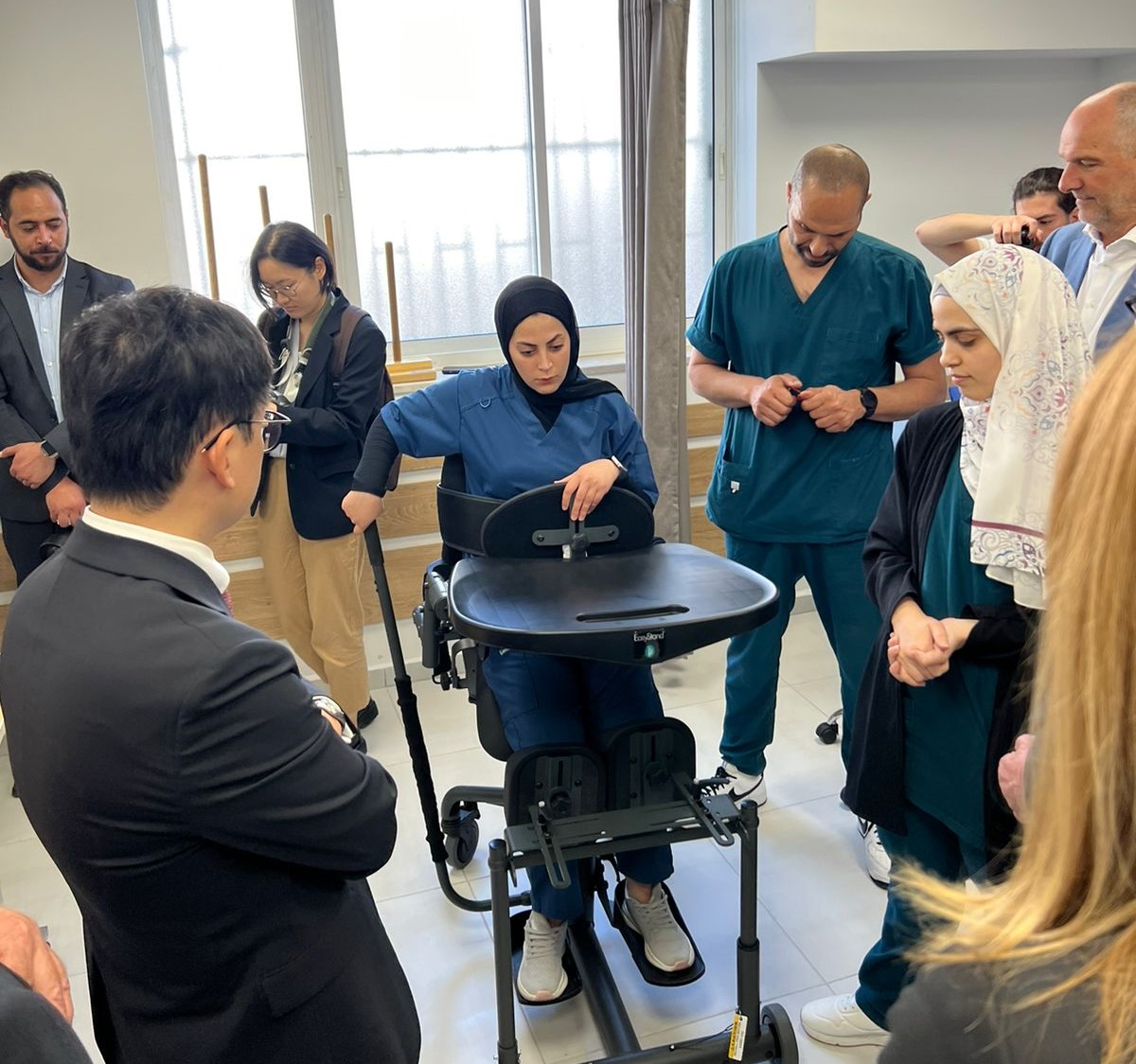
6 May 2025, Ramallah - Two new state-of-the-art physical rehabilitation outpatient centers in Ramallah and Qabatiya governorates of the West Bank were inaugurated today, with the presence of the Palestinian Minister of Health, Head of the Representative Office of the Republic of Korea, Korea International Cooperation Agency (KOICA) Country Director, World Health Organization (WHO) Representative, and United Nations Office for Project Services (UNOPS) Director. These are the first outpatient rehabilitation facilities in the West Bank to be fully integrated into the public health system and operated by the Palestinian Ministry of Health.
The establishment of the rehabilitation facilities has been implemented jointly by the WHO and UNOPS, under the leadership of the Ministry of Health (MoH), with funding provided by KOICA.
Until now, access to rehabilitation services across the West Bank has been severely limited, with less than one rehabilitation bed per 100,000 people, and most services delivered only by nongovernmental organizations. Meanwhile, the number of individuals requiring rehabilitation continues to grow. Ongoing hostilities and violence have resulted in increasing numbers of patients suffering from traumatic injuries, while chronic diseases such as diabetes, stroke, and cardiovascular conditions have led to a rise in physical and neurological impairments.
The new centres were established to meet this growing need for specialized neurological rehabilitation services, with a focus on adults suffering from stroke, traumatic brain injuries, Parkinson’s disease, multiple sclerosis, and other neurological conditions. In total, the centres will serve an estimated 700,000 residents across the two governorates and neighboring communities.
“Today marks the launch of a vital rehabilitation project that will leave a lasting impact on countless Palestinians,” said Dr Majed Abu Ramadan Minister of Health. “The opening of two new centers comes at a time of urgent need for physiotherapy and rehabilitation services. Through robust partnerships and a shared commitment, we can address the pressing challenges facing the Palestinian health sector and ensure that all people receive the care, dignity, and support they deserve.”
Twenty-eight professionals have been recruited by MoH to provide services at the centers. Each centre is staffed by multidisciplinary teams, including specialists in physical therapy, occupational therapy, speech therapy, and mental health, trained by WHO local and international consultants to deliver evidence-based rehabilitation interventions. WHO also supported the development of operational guidelines for the centres and equipped them with new medical devices.
“The launch of the first public rehabilitation outpatient centers in Palestine marks a significant and meaningful step forward in improving health care services and reflects the 20-year partnership between Korea and Palestine, grounded in our shared commitment to human dignity. At a time of great need, the Korean government, through KOICA, has been able to support the provision of essential rehabilitation services through the close collaboration of the Ministry of Health, WHO, and UNOPS. This project stands as a testament to what we can achieve through effective collaboration and long-standing partnership. I look forward to continuing this important cooperation to serve those who need it most,” said Mr Koh, Youngkul, Head of the Representative Office of the Republic of Korea.
“This centre is a turning point for rehabilitation services in the West Bank,” said Dr Richard Peeperkorn, WHO Representative for the occupied Palestinian territory. “It brings essential, life-changing care into the public health system and sets a precedent for how rehabilitation should be integrated across all levels of care. We are proud to support the Ministry of Health in collaboration with KOICA to make quality care accessible to those who have long gone without.”
“UNOPS is proud to have supported the Ministry of Health and KOICA in turning this initiative into a functioning reality,” said Ms. Karuna Herrmann, Director of the UNOPS Jerusalem Office. “Our role focused on ensuring high-quality infrastructure, and coordinated delivery — the building blocks that make sustainable public rehabilitation services possible.”
Each centre is expected to deliver 50-60 therapeutic rehabilitation sessions per day, or 250–300 sessions weekly, providing individualized programmes that focus on restoring function, promoting independence, and improving patients’ overall quality of life. By bridging the gap in outpatient neurorehabilitation services in the northern and middle West Bank, these centres will contribute not only to clinical recovery, but also to broader goals of community reintegration and inclusive health development.



